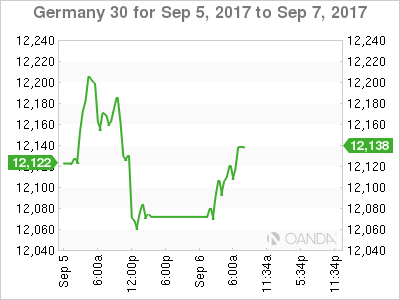The DAX index is unchanged in the Wednesday session. Currently, the DAX is currently trading at 12,118.50, down 0.05% on the day.
On the release front, German Factory Orders dropped 0.7%, well off the forecast of a 0.2% gain. Eurozone Retail PMI edged lower to 50.8 points. On Thursday, the ECB releases its rate statement, followed by a press conference with ECB President Mario Draghi. As well, Germany releases Industrial Production and the Eurozone publishes Revised GDP.
German business leaders are closely following developments at the ECB, as the current quantitative easing (QE) scheme winds down in December. On Wednesday, Deutsche Bank (DE:DBKGn) chief executive John Cryan weighed in on the matter, calling on the ECB to alter course and stop providing “cheap money” to the markets. Cryan warned that the ECB’s monetary stance threatened to cause bubbles in the capital markets, including property, stocks and bonds.
Cryan added that the stronger euro should not serve as an excuse for the ECB to continue its QE program. Turning to Brexit, Cryan argued that Frankfurt is ideally suited to take over from London as the financial hub for European banks. There is fierce jockeying in Europe as to who will take over from London, with Paris, Dublin and Amsterdam all hoping to pick up the spoils after Britain leaves the European Union and large financial companies bid adieu to London.
The euro continues to trade at high levels, and EUR/USD broke above the symbolic 1.20 level in August. The euro has gained some 13% against the dollar in 2017, with two main reasons for the appreciation. First, the euro-area economy has looked impressive this year, led by robust growth in Germany. Second, there is increasing speculation that the ECB will taper its asset purchase program (QE), which is scheduled to terminate in December.
The ECB is yet to decide what to do next, and analysts do not the details of the new program to be announced until October or possibly December. ECB policymakers must weigh competing interests – Germany would like nothing more than the ECB to simply exit the program, which was brought in as an emergency measure to begin with. However, other eurozone members, which are not enjoying German-style growth, favor a gradual tapering of the program, perhaps lowering monthly asset purchases from EUR 60 billion to EUR 45 billion.
The stronger euro is equivalent to a raise in interest rates and has resulted in monetary tightening, so the ECB may favor a slow exit. Aside from the headache of a stronger euro, ECB policymakers must wrestle with the dilemma of a stronger economy that remains gripped by very low inflation. Will the ECB address these concerns at the Thursday meeting? Any hints about a change in monetary policy could have a sharp impact on the euro.
Economic Calendar
Wednesday (September 6)
- 2:00 German Factory Orders. Estimate +0.2%. Actual -0.7%
- 5:00 Eurozone Retail PMI. Actual 50.8
Thursday (September 7)
- 7:45 ECB Minimum Bid Rate. Estimate 0.00%
- 8:30 ECB Press Conference
*All release times are EDT
*Key events are in bold
DAX, Wednesday, September 6 at 7:10 EDT
Open: 12,123.71 High: 12,126.50 Low: 12,056.50 Close: 12,118.50
